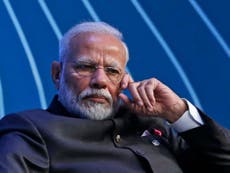The backlash against an Indian jewellery advert with a Hindu-Muslim couple makes me despair
The Twitter storm over Tanishq advert about an interfaith marriage and family proves India is no longer a secular nation in anything but its constitution


Your support helps us to tell the story
From reproductive rights to climate change to Big Tech, The Independent is on the ground when the story is developing. Whether it's investigating the financials of Elon Musk's pro-Trump PAC or producing our latest documentary, 'The A Word', which shines a light on the American women fighting for reproductive rights, we know how important it is to parse out the facts from the messaging.
At such a critical moment in US history, we need reporters on the ground. Your donation allows us to keep sending journalists to speak to both sides of the story.
The Independent is trusted by Americans across the entire political spectrum. And unlike many other quality news outlets, we choose not to lock Americans out of our reporting and analysis with paywalls. We believe quality journalism should be available to everyone, paid for by those who can afford it.
Your support makes all the difference.This past weekend, when I logged into Twitter, I saw “#boycottTanishq” trending. Tanishq, an Indian jewellery brand, released an advert featuring a Hindu-Muslim couple. The premise of the advert is heartfelt: a pregnant Hindu woman says to her Muslim mother-in-law, “This tradition [of baby showers] doesn’t happen in [Muslim] homes, does it?” Her mother-in-law in response says, “Keeping daughters happy is a tradition in every home, isn’t it?”
The reason people wanted to #boycottTanishq, it appeared, was because the brand was “promoting” interfaith marriages. Specifically, they were promoting Hindu-Muslim marriages in an India that the incumbent, Hindu nationalist Bharatiya Janata Party (BJP) sees as solely Hindu. “Love jihad” – the ridiculous, Islamophobic idea that Muslim men target non-Muslim women to “spread” their religion – was the term tweeted alongside the hashtag.
Ironically, the advert’s title, “Ekatvam”, means “unity” or “oneness”.
I didn’t think much of this Twitter storm, they’re daily in India where the BJP has an “IT cell” – purportedly a vast network of paid tweeters and WhatsAppers, who earn a living getting certain topics to trend and making tidbits of fake news go viral.
The following day, however, news broke that Tanishq would be pulling the advert. In a statement released on social media, the brand said they were “deeply saddened with the inadvertent stirring emotions” and would “withdraw this film, keeping in mind the hurt sentiments as well as wellbeing of [their] employees, partners, and store staff.”
Later still, reports of showroom workers being threatened and the company’s brand manager being targeted online and via telephone came to light. One thing became more apparent to me: we’re no longer a secular nation in anything but our constitution.
Muslims have long since been othered and ostracised in India, since the country’s partition with Pakistan. But where Pakistan was founded as an Islamic republic, India, despite being a Hindu majority state, was secular.
I’m still confused as to why this advert made people this angry, to take to their keyboard and spew venom, or how someone can have this much hate to begin with. The advert is, as far as I’m concerned, about a happily married Indian couple and their baby shower.
But I’m equally confused as to how the conversation around this controversy has shifted to what Tanishq, and its parent company Titan, owned by Indian industrialist Ratan Tata, should have done. This cannot be the focus of what this means in a secular democracy. Our gazes need to return to the whys and hows – if an IT cell was involved, we need to look at the extent of its power and what it means. People can (and should) question the power of online trolling, intolerance, and what right-wing Hindus stand for.
The ridiculousness of how this has played out has both infuriated and saddened me. I’m coming to terms with the fact I live in a country in which the ruling party and its far-right Hindu ideology has infiltrated society so deeply that it is triggering for some to see portrayals of unity.
Truthfully, as I watch the world around me unfold and come to terms with the fact that most Indians still prefer arranged marriages (in which people largely marry inside their castes, much less outside their faiths) to so-called traditional ones, I’d be naive to say I didn’t see this coming. But what terrifies me is what is yet to come.
As the BJP continues on its path to make India more Hindu, rewriting our history books to conform to the idea of Hindu glory, spearing through our secular identity by passing a citizenship amendment act that deliberately excludes immigrant Muslims for Indian citizenship, and building Hindu temples on the site where right-wing Hindus allegedly demolished a mosque and all those accused were acquitted, the India of today and tomorrow look less and less like India the day she was born. I'm reminded of the baby shower advert once more: India was, after all, born out of unity.


Join our commenting forum
Join thought-provoking conversations, follow other Independent readers and see their replies
Comments